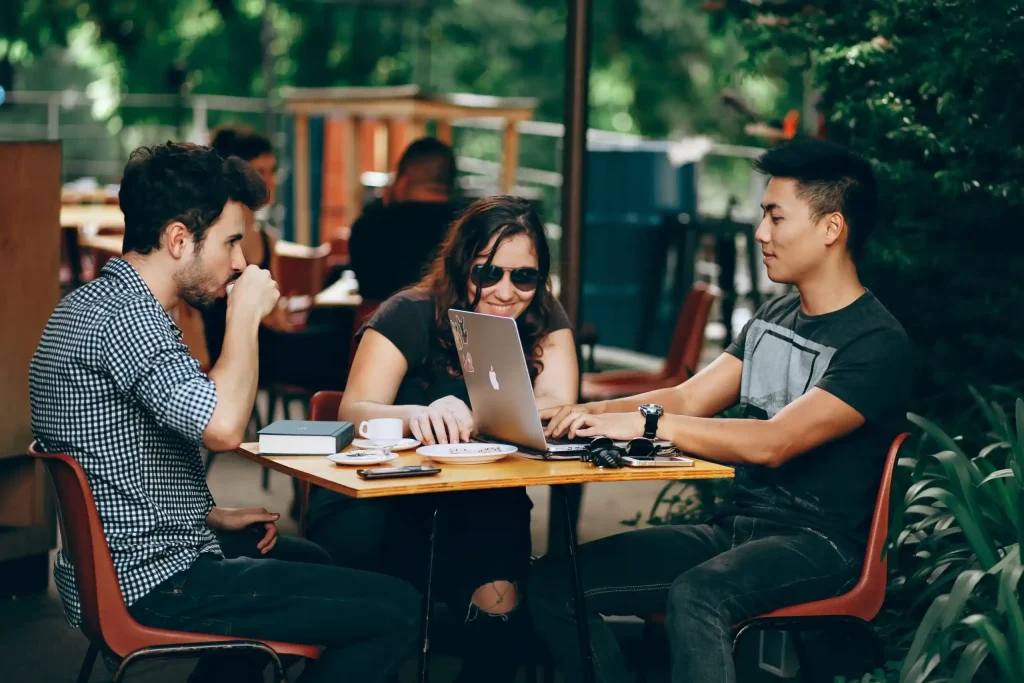Are you considering studying in the United States as an international student? Living in a new country can be exciting and daunting, so research is important before deciding.
In this blog post, we’ll explore some of the pros and cons of life in USA as an international student.
From navigating language barriers to accessing necessary resources and getting out there to make friends, read on for our tips and advice that will help ensure that your stay is a success!

Photo by Ben Duchac on Stocksnap.io
Pros & Cons of Studying in the USA as an International Student
When considering studying in the United States, it’s important to weigh all the pros and cons. Here are some of the advantages and disadvantages to consider:
Pros: | Cons: |
|
|
Pros of Studying in the USA as an International Student
Studying in the United States as an international student has many advantages.
- Quality of Education: The United States has some of the highest-ranked universities in the world, with 8 of the top 10 universities in the Q.S. World University Rankings for 2022 located in the U.S. Additionally, the U.S. has the most Nobel laureates of any country, with 400 Nobel laureates as of 2022. This is one of the most significant benefits of studying in USA for international students.
- Scholarship Options for International Students: The U.S. government, universities, and private organizations offer international students a wide range of scholarships and financial aid. According to the Institute of International Education (IIE), more than 50% of international students in the U.S. receive some form of financial aid.
- Internship Opportunities: Many universities in the U.S. offer internship programs and career services to help international students gain practical experience and make professional connections. The National Association of Colleges and Employers reports that the average hourly wage for an intern in the U.S. is $20.82.
- Earn Better & Easier: According to the U.S. Bureau of Labor Statistics, the median weekly earnings for someone with a bachelor’s degree in the U.S. is $1,305, compared to $781 for someone with a high school diploma. Additionally, a study by the Organisation for Economic Co-operation and Development (OECD) found that the earnings premium for a bachelor’s degree in the U.S. is higher than in any other OECD country.
- Worldwide Recognition of Education: A degree from a U.S. university is highly respected and recognized worldwide. According to the 2022 Q.S. World University Rankings, the U.S. has the most universities in the top 100, and U.S. universities dominate in many fields, including engineering, technology, and business. Thus, a foreign student in USA has the opportunity to obtain a prestigious, quality education.
- Lively and Vibrant Campus Life: U.S. universities are known for their lively and vibrant campus life, with various extracurricular activities, clubs, and sports teams. According to the IIE, 90% of international students in the U.S. report being satisfied with their campus experience. For example, at the University of Southern California, foreign students can join the Trojan Marching Band or attend a basketball game at the Galen Center. UCLA has a variety of student organizations, such as the Bruin Belles dance troupe and the UCLA Film & Television Archive. Meanwhile, University of California Berkeley students can participate in the Cal Band or explore their campus’s many museums and galleries.
- Cultural Diversity: The U.S. is known for its cultural diversity, and studying in the U.S. can expose international students to a wide range of cultures and perspectives. According to the IIE, there were 1,075,496 international students in the U.S. in the 2019-2020 academic year, representing 5.5% of the total U.S. higher education enrollment.
Overall, studying in the USA as an international student offers many advantages, including top-quality education, scholarship options, internship opportunities, and a vibrant campus life.
For international students in the USA, the legal requirements can be confusing. From maintaining visa status to navigating academic policies, it’s a lot. These legalities can be overwhelming especially for students studying law. In such cases, a law paper writing service can be a lifesaver. They provide papers written to academic standards, so students can understand complex legal concepts and achieve their academic targets quickly.
These resources not only help with academic challenges but also serve as great references for understanding U.S. laws so students can stay compliant while studying.
Cons of Studying in the USA as an International Student
Despite the benefits, there are also some drawbacks to studying in the USA as an international student.
- Cost of Education: Studying in the U.S. can be significantly higher than in other countries. According to the College Board, the average cost of tuition and fees for the 2021-2022 academic year at a four-year public university in the U.S. was $10,560 for in-state students and $27,020 for out-of-state students. The average cost for a private university was $38,330. But high sticker prices are only the beginning — once classes end, many graduates struggle under the reality of student loan debt in the U.S., which can continue to impact their financial stability for years.
- Cost of Living: The average cost of living in United States can also be high, especially in major cities. According to Numbeo, the cost of living index in New York City is 100, and other major cities like Los Angeles (84.12), Chicago (77.51), and San Francisco (96.27) are also considered expensive. International students in the US often have to rely on savings or family assistance. It’s important to factor in the actual cost to get a degree in the U.S. to fully understand both tuition and living expenses.
- Cultural Loneliness & Homesickness: International students may experience culture shock and loneliness due to being away from their home country and culture. Many international students report feeling homesick and isolated in their new environment.
- High Workload and Challenging Environment: U.S. universities are known for their rigorous academic programs, and international students may struggle to keep up with the workload. According to a survey by the IIE, 48% of international students in the U.S. reported that their academic workload was much heavier than what they were used to.
- Huge Stress Load: Studying in the United States of America as an international student can be a stressful experience due to the tough academic workload and financial concerns. An American College Health Association survey showed that a staggering 85.6% of college students in the US reported feeling overwhelmed by their workload in the past year. On top of that, foreign students must also adjust to a new culture and lifestyle.
- Hard Reintegration Back Home: After studying in the US, many international students can find it difficult to reintegrate into their home culture. They may feel like they no longer fit in with their peers as they have changed during their time abroad. Experiencing a different culture, way of life and society can be transformative, and readjusting back home can take time.
- Language Barrier: International students may face challenges with language barriers, which can affect their academic performance and social integration. According to a study by the IIE, 17% of international students in the U.S. reported difficulty with the English language.
These are some of the pros and cons to consider when deciding whether to pursue higher education in the U.S. as an international student. It is important to weigh all the factors carefully before making a decision. Studying in the USA opens up many opportunities for further career development but also imposes serious financial obligations.
7 Must-Know Facts about USA Education
If you’re considering studying and living in the USA, here are some important facts you should know:
- Admission Requirements: U.S. colleges have specific admission requirements that international students must meet to be considered for admission. These requirements often include standardized test scores (such as the SAT or ACT), English language proficiency exams (such as TOEFL or IELTS), and academic transcripts.
- Cost of Education: The cost of study in the States can be significantly higher than in other countries. International students should be aware of tuition, fees, and living expenses and explore scholarship and financial aid options to help offset these costs.
- Diversity and Inclusion: U.S. colleges strongly emphasize diversity and inclusion, and many universities have offices and programs dedicated to promoting diversity and supporting underrepresented groups. Students in USA should research the diversity initiatives at each university they are considering and look for opportunities to get involved.
- Internship and Career Opportunities: U.S. colleges often offer robust career services and internship programs to help students gain practical experience and make professional connections. Foreign students should use these opportunities to build their resumes and develop professional skills.
- Academic Rigor: U.S. colleges are known for their rigorous academic programs, and international students should be prepared for a challenging academic environment. International students should research the academic programs and faculty at each university they are considering and make sure they feel comfortable with the academic expectations.
- Social and Cultural Opportunities: U.S. colleges offer various social and cultural activities, from clubs and organizations to sports teams and cultural events. International students should explore these opportunities to meet new people, learn about American culture, and develop new skills and interests.
- Immigration and Visa Requirements: International students in USA must have a valid US student visa to study. The process of obtaining a student visa in United States can be complex and time-consuming, and international students should familiarize themselves with the visa application process and ensure that they have all the necessary documentation and paperwork.
Regarding practical application for international students, it’s important to note that admission requirements can vary significantly from university to university, and it’s important to research each university’s specific requirements and deadlines. International students in the USA have to be incredibly careful and follow all the necessary conditions to be admitted to the university they are interested in.
Studying law in the U.S. is challenging, especially for international students who have to get used to a legal system different from their home country. Complex course work, tight deadlines and new terminology can make law studies more difficult. To address these challenges, students can get specialized help through a custom law assignment service.
They provide solutions for legal assignments so students get well researched and well formatted submissions. By using these services, international students can navigate their academic path better, understand U.S. laws better and excel in this competitive field.
Recommended reads
FAQs
Who is an international student in the USA?
An international student in the USA is a student who is not a citizen or permanent resident of the United States and who has come to the U.S. to study at an accredited college or university. International students must obtain a student visa from the U.S. government to study there. International students in USA must follow all applicable laws and regulations regarding learners from other countries. That is, they must have a full academic load and pay their tuition fees on time. After completing their time studying in America as an international student, according to the above-mentioned regulations, young people with college diplomas must return to their country of residence.
How many international students are in the USA?
The United States is home to the world’s largest international student population, with more than 1,000,000 students enrolled in U.S. colleges and universities during the 2019-2020 school year. In the 2021-2022 school year, this number dropped to approximately 950,000 students.
Why do international students study in the USA?
International students come to the United States to pursue higher education and gain exposure to American culture. The U.S. is home to some of the top universities in the world, offering high-quality educational opportunities with a wide range of programs at all levels. Additionally, the U.S. is attractive due to its diverse culture, vibrant cities, and numerous professional opportunities.
How can international students study in the USA?
International students must obtain an F or M visa from a U.S. Embassy or Consulate to study in the United States. Additionally, students must have been accepted to a SEVP-approved college or university and enrolled full-time for at least one academic year. In addition to these requirements, international students must submit proof of sufficient funds as part of their application process.





